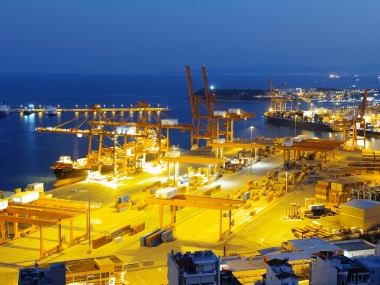Piraeus Transfer Story
Edited on
22 June 2021"Square Peg in a Round Hole: to make a square cartridge compatible with a round one. The nature of the problems at city level are not very different - you work with what resources you have to hand in the best way possible!"

Six years ago, the Municipality of Piraeus realised it needed to take further measures to counteract the impact of the 2008/9 global financial crisis. The team decided to build on the city’s assets, one of the strongest being its competitive location on the coast and status as an active port. They formed a vision to develop innovative areas, including digital, that could create sustainable and higher value jobs linked to the Blue Economy - economic activities related to oceans, seas and coasts and Piraeus’s maritime heritage. This formed the basis of their Blue Growth Strategy 2018-2024, to position the city as a Blue Economy innovation centre with an international reputation. Their digital ambition was to:
(a) Establish a physical and virtual environment that could attract international technology businesses with the ability to scale and create high value job opportunities.
(b) Support existing businesses to be more competitive through technology adoption.
(c) Engage young people to encourage the development of their digital skills.
Realising they didn’t hold all the capability to implement the digital aspects of the Blue Growth Strategy, the Municipality team applied to join the URBACT Tech Revolution Network to benefit from Barnsley’s Good Practice experience.
The TechRev Programme
Barnsley Council identified that a focus on technology and the digital industries could potentially bring a transformation in the employment landscape and grow the number of higher value jobs for local people. In other words, a Tech Revolution. The URBACT Good Practice is made up of two main pillars: Enterprising Barnsley - a successful business support programme; The Digital Media Centre (DMC) - a landmark hub for creative and digital business in the city centre. The Council has also been able to initiate a number of ‘spin off’ activities, including digital support programmes and an expansion of the DMC facilities to create a digital campus. Together this creates 1,500 jobs per year and every £1 of public sector investment leads to an additional £5.33 in private sector investment into the local economy - and an extra £0.96 in local tax revenue.
After they had the chance to absorb the details of the Good Practice, through visits to Barnsley and exchange activities at the transnational meetings, the Piraeus team considered how their city could benefit from the transfer.
The start of the transfer process involved a study visit to Barnsley by members of the Municipality team and selected external experts. They observed the operation of the DMC first-hand and attended several presentations which stimulated questions and discussion. Each member of the group brought back their own impressions: some focused on the economic viability of the centre, others on the most promising digital technologies or new ways to engage local stakeholders, and others on plans for events to exchange ideas, promote collaboration and start-up formation. The learnings from Barnsley have been used to support:
• Formation of an URBACT Local Group (ULG) that engaged the local community and allowed business representatives to have a voice.
• Involvement of additional stakeholders, such as the University of Piraeus, including academic staff and students.
• Development of digital adoption programmes for business, particularly linked to manufacturing and automation.
• Creation of a co-working space for tech entrepreneurs and early-stage businesses.
• Promotion of innovation through introduction to state-of-the art technology, such as digital design and 3D printing.
Outcome: Second Innovation Centre!
Use of the ULG approach to engage the local community has been a big success. Schools in particular have been keen to engage with Blue Lab and teachers need to book their field visits months in advance. In terms of business, it has led to plans for the development of a second, bigger innovation centre as a springboard for entrepreneurial activity and the cultivation of a start-up mentality in the city.
Piraeus has used the transfer of Barnsley’s Good Practice to complement its strategic vision for the promotion of the Blue Economy. Through Blue Lab, it sees that having “borrowed” the idea of creating a space for young people to come together, learning to use digital technologies and testing entrepreneurial ideas, a ‘tech culture’ is developing – something that was previously lacking in seminars and school visits. This is important because it will develop a new mentality regarding technology and automation which will feed into the job market, ultimately leading to a greater receptiveness to digital adoption and the subsequent development of higher-value jobs
The team also ensured that the emphasis of the Blue Lab was on the promotion of innovation through the provision of not only of a space, but also of state-of-the art technologies. Due to the number of SME manufacturers in the city, 3D printing was selected as it suited the custom manufacturing model of many of the businesses, and this was supplemented by seminars on the use of automation technologies.
Concluding Thoughts
The Municipality team adopted an entrepreneurial approach themselves, such being persistent, flexible and holding on to the firm belief of the need to change. Taking this approach was key to getting the project going during the first few months. Next, they need to instil this type of mindset in the city’s businesses, to help prepare them for a digital future. The Municipality Team wants to build on the TechRevolution transfer and continues to have big plans, including a larger co-working space, training facilities to upskill the workforce and investing in more future technologies.
 Submitted by Matthew Snowden on
Submitted by Matthew Snowden on
